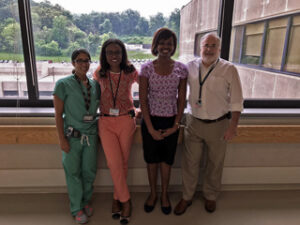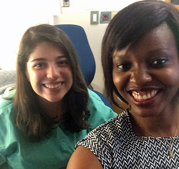 I am final year medical student of the University of Ibadan, Nigeria. I am expected, as part of my clinical rotations, to do an elective program in any hospital of my choice around the world for a four weeks period.
I am final year medical student of the University of Ibadan, Nigeria. I am expected, as part of my clinical rotations, to do an elective program in any hospital of my choice around the world for a four weeks period.
After a rigorous search of suitable schools and hospitals, both locally and internationally, of where I would possibly be accepted, I got a place in Penn-State Medical Center (PMC) in Hershey, Pennsylvania. I was very elated.
A lot of paper work clearance had to be done on my arrival before I could start my rotation in the Neonatology Intensive Care Unit (NICU).
I did the rotation under attending Dr. Timothy Palmer. There were other hands always willing to carry me along throughout my stay in the unit starting from the medical students, the registered nurses (RN), nurse practitioners and other fellows in the unit. I was pleased with their kindness towards me during my short stay in the unit.
My expectations were very high as I had not only experienced the care of neonates in my school in Nigeria—I had also visited several websites and asked a lot of questions on how the neonates were taken care of in hospitals in America. What I saw and heard whet my appetite to the extent that my previous dislike for pediatrics was slowly changing to one of affection. I had high hopes of what I was going to be involved with.
Different cultures, different people, different environment, and I still had a pleasant experience.” ~Chidimma Ezeilo, BRI chapter member, University of Ibadan, Oyo State, Nigeria
When I got to the department, my expectations were not only met, but surpassed. The newborns in the various incubators aged from 23 weeks to term babies with several diseases, some of which I had seen my teachers  in school manage, to others which I never knew really existed except in books. I had never heard of Brooke syndrome except when I got to the unit and saw a baby with it. I never knew I would see a child with Pierre Robins Syndrome with classical features glaring at my face. I would never have thought that a 23-weeker would ever survive to be able to grow into an adult who will live normal life (even with all sorts of tubes connected to the baby). The babies were connected to sophisticated instruments, which I had read about but never seen. Genetic analysis was done for babies who presented with specific congenital anomalies. Babies, as small as my foot (I am a size 12…so that is big enough) survived.
in school manage, to others which I never knew really existed except in books. I had never heard of Brooke syndrome except when I got to the unit and saw a baby with it. I never knew I would see a child with Pierre Robins Syndrome with classical features glaring at my face. I would never have thought that a 23-weeker would ever survive to be able to grow into an adult who will live normal life (even with all sorts of tubes connected to the baby). The babies were connected to sophisticated instruments, which I had read about but never seen. Genetic analysis was done for babies who presented with specific congenital anomalies. Babies, as small as my foot (I am a size 12…so that is big enough) survived.
Of course some babies died (sad indeed). One case that intrigued me was a baby born with hypoplastic lungs. I was shocked that the baby was strong enough to survive the delivery process. But the child did not last so long in the unit.
Parents overall were happy with their children’s medical outcomes as they followed their babies’ care to the letter. Their questions were answered by the managing team with so much love, precision and empathy for the children. Physicians and other personnel working in the unit were always on their toes giving the children the best treatment they could possibly get for optimal survival. I was observing, asking so many questions, interacting with my team and growing my love for pediatrics— especially neonatology department— more and more.
The care was so different from what I had earlier known in Nigeria. The health care system allowed more babies to survive as parents paid, not from their pockets, but via insurance.
 Different cultures, different people, different environment, and I still had a pleasant experience.
Different cultures, different people, different environment, and I still had a pleasant experience.
All in all, I had a great clinical elective working in the neonatology department in PMC, Hershey.
Going back to Nigeria, I will see everything from a different perspective. A lot needs to be changed in the health system in Nigeria, and I know that they can be modified despite the economy of the country. It needs the cooperation of every health personnel from the government to the medical student—such little things like the consultant-student relationship (if this improves a great deal, students will be more productive in their work) to the level of effective health insurance system for all. Many acts need to be implemented, but every day Nigeria will take the step up to reach the goal of good health for all.
I love pediatrics far more than before I started the rotation. I am very grateful for the splendid time I spent there and the knowledge I have gathered for the betterment of Nigeria.
